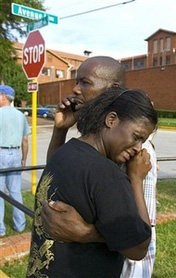 |
 |
 |
 Editorials | Issues | August 2007 Editorials | Issues | August 2007  
Texas Carried Out Its 400th Execution in Thirty Years to Relative Indifference
 Aline Leclerc - Le Monde Aline Leclerc - Le Monde
go to original


| | Dyamond Alexander, sister of Johnny Ray Conner, is consoled by James Alexander, after hearing of the execution of Johnny Ray Conner, Wednesday, Aug. 22, 2007, at the Huntsville Unit in Huntsville, Texas. (AP/Paul Zoeller) |
Johnny Conner, a 32-year-old black man condemned to death for the murder of an employee during a grocery store holdup, was executed by lethal injection Wednesday, August 22, in Texas. That's the 400th execution in that American state since the death penalty was reinstated in 1976.

While the event aroused few commentaries on the other side of the Atlantic, where it was little-mentioned in most of the national media, the European Union expressed its "deep regret" and asked Texas Governor Rick Perry "insistently to do everything within his power to stay all future executions and to consider establishing a moratorium in the state of Texas."

The Texas governor backhandedly brushed off that suggestion in a laconic communiqué published on his Internet site: "230 years ago, our forefathers fought a war to throw off the yoke of a European monarch and gain the freedom of self-determination. Texans long ago decided that the death penalty is a just and appropriate punishment for the most horrible crimes committed against our citizens. While we respect our friends in Europe, welcome their investment in our state and appreciate their interest in our laws, Texans are doing just fine governing Texas."

"What Is Happening to Me Is Wrong"

So the execution took place Wednesday shortly after 6 p.m. (1 a.m. Thursday in Paris) in the Huntsville Prison. The condemned man was pronounced dead eight minutes after the lethal injection. "What is happening to me is wrong and the system is out of whack," declared Johnny Conner, who has always maintained his innocence, before dying. "It's fate. That's life. It's something Allah wants me to do (...) I don't hold it against you. When I've gone through the Gates to Paradise, I'll wait for you. Please forgive me."

Johnny Conner had been condemned to death in 1999 for the murder of Kathyanna Nguyen, killed by gunshot during a holdup of the store where she worked. During the trial, a patron who had been wounded in the shoulder and two other people had identified him as the robber. Moreover, his fingerprints were found on a bottle in the grocery store.

Nonetheless, in 2005, a judge ordered that a new trial be held, highlighting the incompetence of Johnny Conner's lawyers, who had not pointed out the fact that an old leg wound made the young man limp, preventing him from running away. That decision was annulled by a federal appeals court in January.

According to the Washington Death Penalty Information Center, the United States has executed 1,091 people since 1976; more than a third were executed by the state of Texas. Three other executions are planned before the end of August.
New Executions in Japan and the United States
Pierre Haski - Rue89
go to original

The death penalty continues to be applied in many countries, including two large industrialized countries: the United States and Japan, which have each just conducted executions. While the 27 countries of the European Union and other European countries beyond the Union have totally abolished capital punishment, the attitude of these two democracies weakens the secular fight against this punishment, which is still part of the law in 78 countries.

Japan, the No. 2 global economic power, which de facto suspended capital executions between 1989 and 1993, executed three men on Thursday. The three men, aged 60, 63 and 69, convicted of murder, were told about their execution ten minutes before they were killed by hanging in the Nagoya prison, under archaic conditions that are regularly denounced within Japan itself.

These three cases bring the number of executions under the reign of Justice Minister Jinen Nagase - unlike his predecessor, a wild partisan for capital punishment - to ten. In January 2007 Japan counted 100 people condemned to death on its death row, a fifth of whom had been condemned in 2006 alone. The Japanese population continues to support capital punishment. Nonetheless, the NGO, Together Against Capital Punishment, emphasizes that "executions, which most often take place in summer and at the end of the year, happen while Parliament is in recess to avoid any Parliamentary discussion...."

In the United States, and in a more routine manner, Texas executed its 400th convict since the reinstatement of capital punishment in 1982. Johnny Ray Conner, 32, convicted of murder, was executed by injection in Huntsville after spending nearly eight years on death row.

Since reinstatement of the death penalty in 1976 by the Supreme Court, 1092 persons have been executed in the United States - 400 in the state of Texas alone. "It's a sad day for the progress, or absence of progress, in human rights in this state," commented Rick Halperin, president of a Texas association that demands abolition of the death penalty, according to Reuters.

Translation: Truthout French language editor Leslie Thatcher. | 
 | |
 |



